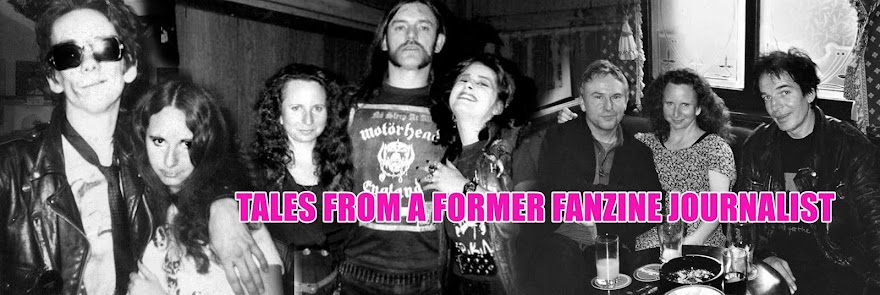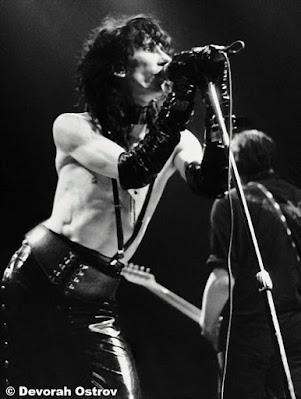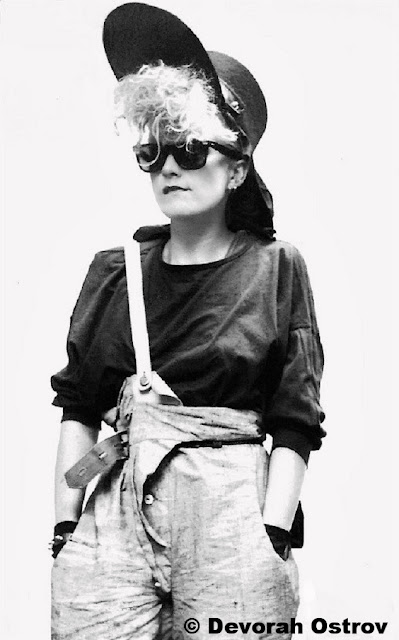Originally published in Rave-Up #4 (1982)
Interview by Devorah Ostrov
Still riding high on the UK chart success of Hit And Run and before the release of their third album, a short string of US dates (cheekily called the "Lock Up Your Sons" tour) brought Girlschool to the Old Waldorf in April.
Following their soundcheck, we spoke to Kim, Kelly, Denise, and newcomer Gil about the tour, discovered what their parents think of their alliance with Motorhead, and uncovered scandalous tales of what went on at a real girls' school. Plus, Kim took the opportunity to quiz Denise and Gil about their work history experience!
Q: With the massive success of Hit And Run, do the music papers tend to treat you with more respect?
Kim: I don't know. I think we got a bit of a backlash, didn't we? They built us up and built us up... We were always in the press for a while. And then we started doing really well, and the album started doing really well. Then suddenly, they thought they would start criticizing us!
Q: When you started out, did you have to prove yourselves to the audience because you were girls? Or didn't that matter to English audiences?
Kim: I don't know, really. We didn't think we had to prove ourselves, but I expect we did in a way. They [the audience] used to come along and pack down three drinks in the pub beforehand and then just come and have a good laugh. But a lot of them came back again because they liked the music.
 |
| Motorhead & Girlschool at Friars Aylesbury |
Kelly: It's starting again over here because we don't know anybody and we're playing small clubs.
Q: This is your first time touring America?
Kim: Yeah, it's been fab [sarcastically].
Kelly: Fun, fun, fun [also sarcastically].
Q: How are the mostly male audiences treating you here as opposed to England?
Kim: Really well, actually! We're quite surprised. A few of them know the songs. It's nice. We feel like we're at home!
Q: Have you been getting good reviews so far on the tour?
Kelly: Yeah! I don't know why. It's surprising.
Kim: I don't know why, either. But yeah, they've been really good. They think we've done these amazing things, like going way over the top, you know. And we're saying, "Wait, are they talking about us?"
Q: Where have you played so far?
All Together: Baltimore, New York, Philadelphia, Boston, Trenton, New Haven, Chicago, Detroit, Cleveland...
Q: New Haven? Trenton? No one ever plays there!
Kim: We'd never even heard of New Haven and Trenton.
Q: Did anyone come to see you there?
Kim: Yeah! I suppose because they don't have many bands there.
Q: They didn't care who you were!
 |
| L-R: Denise Dufort, Kelly Johnson, Kim McAuliffe and Gil Weston (publicity photo) |
Kim: Exactly! We did a gig in Portland [Oregon], and that was sold out — 3,000 people! We were looking at the city and there was nothing to do at night. So it must have been a big event. A gig!
Q: Is the Old Waldorf the smallest place you've played in a while?
Kim: We've played a few over here that have been about this size. But we've never played to people sitting down eating dinner!
Q: Motorhead played here last year. It was amazing!
Kim: Yeah, right! Steve, one of our guitar roadies was with them. He said they didn't have any tables or chairs for them. But they knew about it in advance. If we'd known... Nobody tells us anything! [Note: Most of the tables and chairs were removed before the show started.]
Q: Did your parents warn you not to hang around with Motorhead because they were a bad influence?
 |
| Mercury/Polygram Records publicity photo |
Kim: No, not really. They all really like Motorhead. My mum and dad went to their last concert at the Hammersmith. They're really into the band; they helped us a lot in the beginning. They never said, "Oh no, we don't want you to do this. We want you to become a secretary." They helped us all they could. We're pretty lucky, really.
Q: Did any of you actually work as secretaries?
Kim: I worked in a bank, that's pretty close. [Pointing at Kelly] She was various things. What were you, Gil?
Gil: A skivvy.
Denise: I used to sell washing machines and 'fridges and stuff in a big chain shop. They sold kettles, tea sets, paint, posters...
Kim: Did you ever sell anything?
Denise: Yeah! I used to get wages, but I'd get a commission on top if I sold a washing machine. I sold four in a week once.
Q: Were you more influenced by male heavy metal groups or Suzi Quatro and other female rockers?
Kim: Neither! I used to love Led Zeppelin, and I suppose they influenced me quite a bit. But we...
Kelly: She actually loves them!
Kim: I do, yeah! I think they're one of the best bands ever in the whole universe! I don't know really, there's so many. I think David Bowie is a pretty common hero with this band. He's just terrific! He's my hero. [Gil was wearing a David Bowie t-shirt.]
Q: Did any of you go to a girls' school?
 |
| Kelly Johnson posing for my camera at Grauman's Chinese Theatre, and walking down Hollywood Blvd. before the show - Los Angeles, California, 2004 (Photos: Devorah Ostrov) |
Kim: I did, yeah. Denise did. They're good fun! I used to have great laughs at school. We used to cause riots!
Kelly: She used to beat people up!
Kim: I didn't beat people up! We just used to go out and get pissed at dinner time, go back and create havoc, you know. There wasn't much they could do with six or seven drunken girls. Our school had the highest pregnancy rate in London. We all had our own boyfriends who'd come and pick us up after school. I used to have this cute boyfriend with a motorbike who'd pick me up. But while we were at school it was just a lot of girls together. Like it is now, actually. From one girls' school to another!
The opening group, Stepmothers, start their soundcheck and everyone gets distracted...
Kim: Is this the support band? They're really good! They're heavy. I thought they were going to be punk rock. Or are they heavy?
Q: They're heavy metal punk rockers! The heavy metal kids don't like them because they're too punk rock. And the punks don't like them because they're too heavy metal.
 |
| Stiff Records advert for the US release of Hit And Run (a combination of the first two UK albums) plus exciting tour information! |
Kim: We had exactly the same problem. When we came out, it was the new wave era in Britain. So, when we used to play new wave clubs, they didn't like us 'cause we were too heavy metal. When we played heavy metal places, they didn't like us 'cause they thought we were too much like new wave.
Kelly: We got a little confused. We developed this neurosis.
Q: What did you finally decide you were?
Kim: The kids decided what we were.
Kelly: We wanted to be labeled!
Kim: We got labeled in the end 'cause Motorhead came along, saw us, and wanted us to support them on tour. We said, "Yes!" And then of course we started to play to all heavy metal audiences. After that, we were labeled as HEAVY METAL!









































